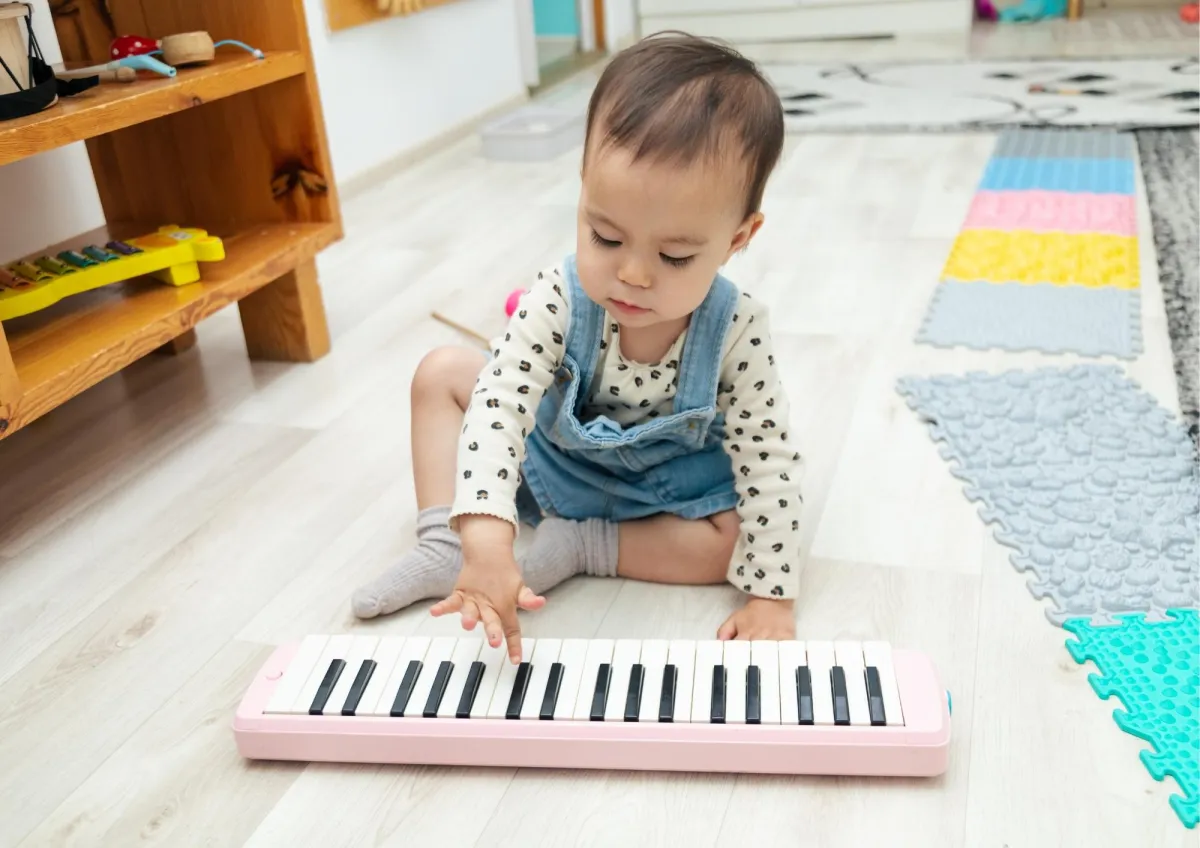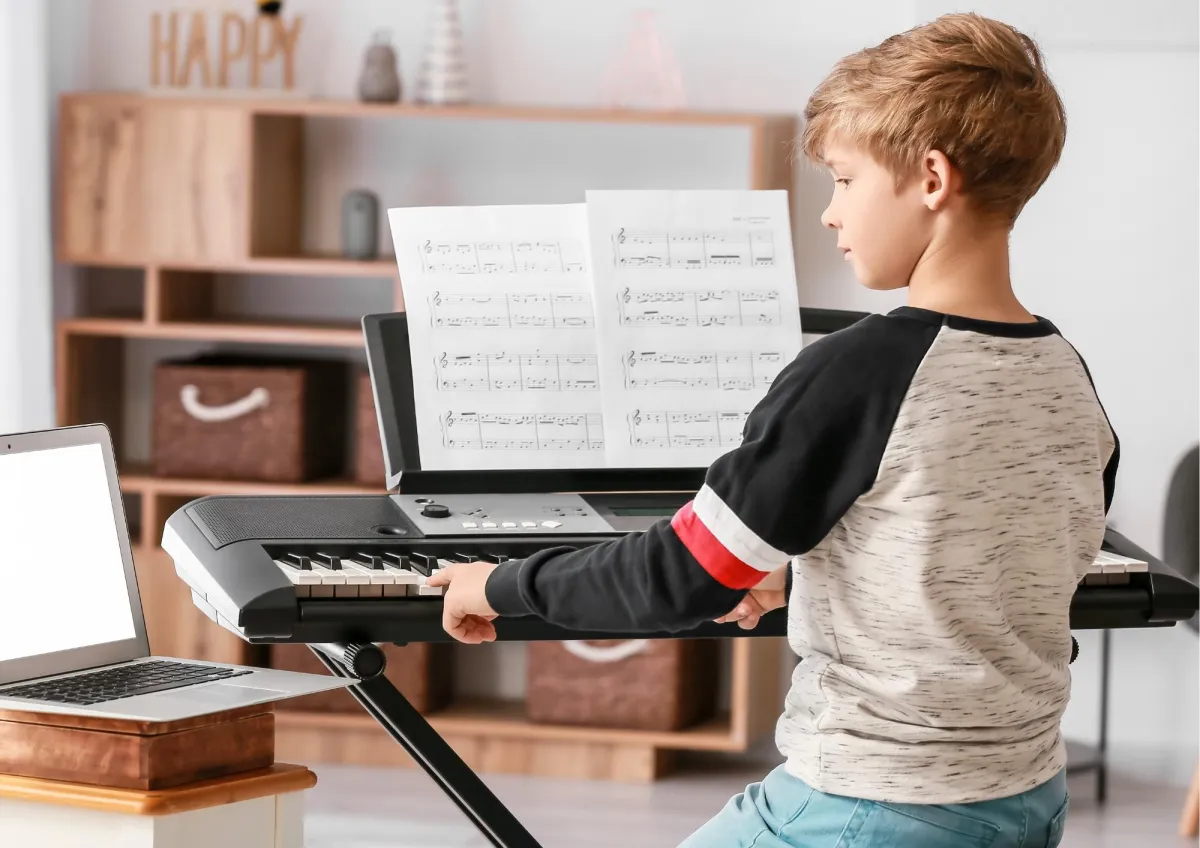Virtual Piano Class
Quick Reads Blog
Join Ms. Meghan as we learn more about learning the piano online, creativity sparks, contemporary piano, music ideas, and so much more! Each post is designed with you in mind to be "quick" without lacking the depth you're looking for.


Lifelong Benefits of Learning Piano in Childhood
Learning to play the piano as a child isn't just about mastering a musical instrument—it's about laying the foundation for a lifetime of growth, enrichment, and fulfillment. In this essay, we'll delve deep into the myriad ways in which early piano education shapes cognitive, emotional, and social development, setting the stage for success and well-being in adulthood.
Cognitive Development:
At its core, playing the piano is a complex cognitive task that engages multiple areas of the brain simultaneously. From deciphering musical notation to coordinating hand movements and interpreting dynamics, playing the piano requires a high level of concentration, memory, and problem-solving skills. Research has shown that children who learn to play the piano at a young age demonstrate enhanced cognitive abilities, including improved memory, attention, and spatial reasoning.
Moreover, the process of learning to play the piano fosters the development of executive functions such as self-regulation, planning, and task management. As children navigate the challenges of mastering new pieces and overcoming performance anxiety, they learn valuable strategies for goal setting, perseverance, and resilience that serve them well in all areas of life.
Additionally, learning piano involves the development of auditory discrimination and fine motor skills. When a child learns to differentiate between various notes and rhythms, they are honing their listening skills and auditory processing abilities. Similarly, the intricate finger movements required to play the piano contribute to the refinement of fine motor skills, which can have a positive impact on tasks such as writing, typing, and other manual dexterity activities.
Emotional Well-being:
Beyond its cognitive benefits, learning to play the piano provides a powerful outlet for emotional expression and self-discovery. Music has the unique ability to evoke and communicate a wide range of emotions, allowing children to explore and process their feelings in a safe and constructive way. Whether they're expressing joy through a lively Mozart sonata or navigating the depths of sadness in a haunting Chopin nocturne, playing the piano provides a means of connecting with and understanding their own emotions.
In addition, the sense of accomplishment and pride that comes from mastering a challenging piece or performing in front of an audience can boost self-esteem and confidence. By setting and achieving musical goals, children learn to believe in themselves and their abilities, laying the groundwork for a positive self-image that carries over into other areas of life.
Furthermore, music has been shown to have therapeutic effects on mental health, reducing stress, anxiety, and depression. When children engage in playing the piano, they experience a sense of relaxation and emotional release, which can help them cope with the challenges and pressures of daily life. Moreover, the discipline and focus required for regular practice sessions can instill a sense of purpose and structure, providing a sense of stability and well-being in an increasingly chaotic world.
Social Skills:
Playing the piano is often perceived as a solitary pursuit, but in reality, it offers numerous opportunities for social interaction and collaboration. Whether it's participating in recitals, accompanying other musicians, or playing in a band or ensemble, children who learn to play the piano develop important social skills such as teamwork, communication, and cooperation.
Moreover, music has the power to bring people together across cultural, linguistic, and generational boundaries, fostering a sense of connection and community. By participating in musical activities and engaging with others who share their passion for music, children develop empathy, tolerance, and an appreciation for diversity that enriches their relationships and broadens their worldview.
Furthermore, collaborative musical experiences can provide opportunities for leadership and peer mentorship. When children work together to perform a piece of music, they learn to communicate effectively, compromise, and support one another, fostering a sense of camaraderie and mutual respect. Moreover, performing in front of an audience can help children develop confidence and poise, as they learn to overcome stage fright and connect with listeners on an emotional level.
Academic Achievement:
The benefits of learning to play the piano extend beyond the realm of music to positively impact academic achievement and success in school. Numerous studies have demonstrated a correlation between music education and improved performance in subjects such as math, science, and language arts. The skills and abilities cultivated through piano study—such as attention to detail, pattern recognition, and auditory discrimination—transfer to other academic domains, providing children with a competitive edge in the classroom.
Moreover, the discipline and focus required to practice and master the piano instill valuable study habits and work ethic that translate into academic success. By learning to manage their time effectively and prioritize their commitments, children develop the skills they need to excel academically and pursue their educational goals with confidence and determination.
Furthermore, exposure to music and the arts has been shown to enhance creativity and innovation, which are increasingly valued in today's knowledge-based economy. When children engage in the creative process of making music, they learn to think outside the box, experiment with new ideas, and approach problems from multiple perspectives. These creative skills are essential for success in fields such as science, technology, engineering, and mathematics (STEM), where innovation and problem-solving are paramount.
Lifelong Learning and Creativity:
Perhaps the most enduring benefit of learning to play the piano in childhood is the cultivation of a lifelong love of music and learning. By exposing children to the beauty and richness of classical and contemporary music, piano study ignites a passion for creativity and self-expression that continues to inspire and enrich their lives long after their formal lessons have ended.
Moreover, the skills and experiences gained through piano study provide a solid foundation for pursuing a wide range of interests and activities in adulthood. Whether it's learning a new instrument, exploring the arts, or pursuing a career in music or related fields, the discipline, resilience, and creativity fostered by early piano education empower children to embrace new challenges and opportunities with enthusiasm and confidence.
Furthermore, playing the piano provides a means of self-expression and personal fulfillment that can enrich every aspect of life. Whether it's playing for personal enjoyment, performing for friends and family, or sharing music with the community, the piano offers endless opportunities for creativity, connection, and growth. Moreover, the discipline and dedication required for regular practice sessions instill a sense of purpose and fulfillment, providing a source of joy and satisfaction that lasts a lifetime.
As Such:
Learning to play the piano as a child has a profound and lasting impact on cognitive, emotional, and social development, setting the stage for success and fulfillment in all areas of life. From enhanced cognitive abilities and emotional well-being to improved social skills and academic achievement, the benefits of early piano education extend far beyond the confines of the music room, enriching the lives of children and shaping their future in ways both tangible and profound. By investing in piano education for our children, we are investing in a brighter, more harmonious future for generations to come.
We're thrilled that you've enjoyed our blogs and are eager to explore the world of music even further. The journey doesn't have to end here! If you're yearning to expand your musical horizons, we'd love to chat!
Whether you're a beginner eager to learn the basics or an experienced musician seeking to refine your skills, our free music class is perfect for you. Unleash your creativity, discover new sounds, and cultivate a deeper understanding of music and schedule a free music class with us by clicking the button below!

Lifelong Benefits of Learning Piano in Childhood
Learning to play the piano as a child isn't just about mastering a musical instrument—it's about laying the foundation for a lifetime of growth, enrichment, and fulfillment. In this essay, we'll delve deep into the myriad ways in which early piano education shapes cognitive, emotional, and social development, setting the stage for success and well-being in adulthood.
Cognitive Development:
At its core, playing the piano is a complex cognitive task that engages multiple areas of the brain simultaneously. From deciphering musical notation to coordinating hand movements and interpreting dynamics, playing the piano requires a high level of concentration, memory, and problem-solving skills. Research has shown that children who learn to play the piano at a young age demonstrate enhanced cognitive abilities, including improved memory, attention, and spatial reasoning.
Moreover, the process of learning to play the piano fosters the development of executive functions such as self-regulation, planning, and task management. As children navigate the challenges of mastering new pieces and overcoming performance anxiety, they learn valuable strategies for goal setting, perseverance, and resilience that serve them well in all areas of life.
Additionally, learning piano involves the development of auditory discrimination and fine motor skills. When a child learns to differentiate between various notes and rhythms, they are honing their listening skills and auditory processing abilities. Similarly, the intricate finger movements required to play the piano contribute to the refinement of fine motor skills, which can have a positive impact on tasks such as writing, typing, and other manual dexterity activities.
Emotional Well-being:
Beyond its cognitive benefits, learning to play the piano provides a powerful outlet for emotional expression and self-discovery. Music has the unique ability to evoke and communicate a wide range of emotions, allowing children to explore and process their feelings in a safe and constructive way. Whether they're expressing joy through a lively Mozart sonata or navigating the depths of sadness in a haunting Chopin nocturne, playing the piano provides a means of connecting with and understanding their own emotions.
In addition, the sense of accomplishment and pride that comes from mastering a challenging piece or performing in front of an audience can boost self-esteem and confidence. By setting and achieving musical goals, children learn to believe in themselves and their abilities, laying the groundwork for a positive self-image that carries over into other areas of life.
Furthermore, music has been shown to have therapeutic effects on mental health, reducing stress, anxiety, and depression. When children engage in playing the piano, they experience a sense of relaxation and emotional release, which can help them cope with the challenges and pressures of daily life. Moreover, the discipline and focus required for regular practice sessions can instill a sense of purpose and structure, providing a sense of stability and well-being in an increasingly chaotic world.
Social Skills:
Playing the piano is often perceived as a solitary pursuit, but in reality, it offers numerous opportunities for social interaction and collaboration. Whether it's participating in recitals, accompanying other musicians, or playing in a band or ensemble, children who learn to play the piano develop important social skills such as teamwork, communication, and cooperation.
Moreover, music has the power to bring people together across cultural, linguistic, and generational boundaries, fostering a sense of connection and community. By participating in musical activities and engaging with others who share their passion for music, children develop empathy, tolerance, and an appreciation for diversity that enriches their relationships and broadens their worldview.
Furthermore, collaborative musical experiences can provide opportunities for leadership and peer mentorship. When children work together to perform a piece of music, they learn to communicate effectively, compromise, and support one another, fostering a sense of camaraderie and mutual respect. Moreover, performing in front of an audience can help children develop confidence and poise, as they learn to overcome stage fright and connect with listeners on an emotional level.
Academic Achievement:
The benefits of learning to play the piano extend beyond the realm of music to positively impact academic achievement and success in school. Numerous studies have demonstrated a correlation between music education and improved performance in subjects such as math, science, and language arts. The skills and abilities cultivated through piano study—such as attention to detail, pattern recognition, and auditory discrimination—transfer to other academic domains, providing children with a competitive edge in the classroom.
Moreover, the discipline and focus required to practice and master the piano instill valuable study habits and work ethic that translate into academic success. By learning to manage their time effectively and prioritize their commitments, children develop the skills they need to excel academically and pursue their educational goals with confidence and determination.
Furthermore, exposure to music and the arts has been shown to enhance creativity and innovation, which are increasingly valued in today's knowledge-based economy. When children engage in the creative process of making music, they learn to think outside the box, experiment with new ideas, and approach problems from multiple perspectives. These creative skills are essential for success in fields such as science, technology, engineering, and mathematics (STEM), where innovation and problem-solving are paramount.
Lifelong Learning and Creativity:
Perhaps the most enduring benefit of learning to play the piano in childhood is the cultivation of a lifelong love of music and learning. By exposing children to the beauty and richness of classical and contemporary music, piano study ignites a passion for creativity and self-expression that continues to inspire and enrich their lives long after their formal lessons have ended.
Moreover, the skills and experiences gained through piano study provide a solid foundation for pursuing a wide range of interests and activities in adulthood. Whether it's learning a new instrument, exploring the arts, or pursuing a career in music or related fields, the discipline, resilience, and creativity fostered by early piano education empower children to embrace new challenges and opportunities with enthusiasm and confidence.
Furthermore, playing the piano provides a means of self-expression and personal fulfillment that can enrich every aspect of life. Whether it's playing for personal enjoyment, performing for friends and family, or sharing music with the community, the piano offers endless opportunities for creativity, connection, and growth. Moreover, the discipline and dedication required for regular practice sessions instill a sense of purpose and fulfillment, providing a source of joy and satisfaction that lasts a lifetime.
As Such:
Learning to play the piano as a child has a profound and lasting impact on cognitive, emotional, and social development, setting the stage for success and fulfillment in all areas of life. From enhanced cognitive abilities and emotional well-being to improved social skills and academic achievement, the benefits of early piano education extend far beyond the confines of the music room, enriching the lives of children and shaping their future in ways both tangible and profound. By investing in piano education for our children, we are investing in a brighter, more harmonious future for generations to come.

Written By: Meghan Labadie
Meghan is our resident contemporary piano teacher for beginners, specializing in kids ages 3-12. She lives in the greater Seattle area and holds a Master of Education, Learning and Technology. She loves the outdoors, the color pink, and can't seem to put down a good book.


Contact Us
Open Hours
Social Media
Monday - Thursday: Scheduled 1v1 Lessons
Friday - Sunday: Trial Lessons
Virtual Piano Class
Quick Reads Blog

Join Ms. Meghan as we learn more about learning the piano online, creativity sparks, contemporary piano, music ideas, and so much more! Each post is designed with you in mind to be "quick" without lacking the depth you're looking for.

Lifelong Benefits of Learning Piano in Childhood
Learning to play the piano as a child isn't just about mastering a musical instrument—it's about laying the foundation for a lifetime of growth, enrichment, and fulfillment. In this essay, we'll delve deep into the myriad ways in which early piano education shapes cognitive, emotional, and social development, setting the stage for success and well-being in adulthood.
Cognitive Development:
At its core, playing the piano is a complex cognitive task that engages multiple areas of the brain simultaneously. From deciphering musical notation to coordinating hand movements and interpreting dynamics, playing the piano requires a high level of concentration, memory, and problem-solving skills. Research has shown that children who learn to play the piano at a young age demonstrate enhanced cognitive abilities, including improved memory, attention, and spatial reasoning.
Moreover, the process of learning to play the piano fosters the development of executive functions such as self-regulation, planning, and task management. As children navigate the challenges of mastering new pieces and overcoming performance anxiety, they learn valuable strategies for goal setting, perseverance, and resilience that serve them well in all areas of life.
Additionally, learning piano involves the development of auditory discrimination and fine motor skills. When a child learns to differentiate between various notes and rhythms, they are honing their listening skills and auditory processing abilities. Similarly, the intricate finger movements required to play the piano contribute to the refinement of fine motor skills, which can have a positive impact on tasks such as writing, typing, and other manual dexterity activities.
Emotional Well-being:
Beyond its cognitive benefits, learning to play the piano provides a powerful outlet for emotional expression and self-discovery. Music has the unique ability to evoke and communicate a wide range of emotions, allowing children to explore and process their feelings in a safe and constructive way. Whether they're expressing joy through a lively Mozart sonata or navigating the depths of sadness in a haunting Chopin nocturne, playing the piano provides a means of connecting with and understanding their own emotions.
In addition, the sense of accomplishment and pride that comes from mastering a challenging piece or performing in front of an audience can boost self-esteem and confidence. By setting and achieving musical goals, children learn to believe in themselves and their abilities, laying the groundwork for a positive self-image that carries over into other areas of life.
Furthermore, music has been shown to have therapeutic effects on mental health, reducing stress, anxiety, and depression. When children engage in playing the piano, they experience a sense of relaxation and emotional release, which can help them cope with the challenges and pressures of daily life. Moreover, the discipline and focus required for regular practice sessions can instill a sense of purpose and structure, providing a sense of stability and well-being in an increasingly chaotic world.
Social Skills:
Playing the piano is often perceived as a solitary pursuit, but in reality, it offers numerous opportunities for social interaction and collaboration. Whether it's participating in recitals, accompanying other musicians, or playing in a band or ensemble, children who learn to play the piano develop important social skills such as teamwork, communication, and cooperation.
Moreover, music has the power to bring people together across cultural, linguistic, and generational boundaries, fostering a sense of connection and community. By participating in musical activities and engaging with others who share their passion for music, children develop empathy, tolerance, and an appreciation for diversity that enriches their relationships and broadens their worldview.
Furthermore, collaborative musical experiences can provide opportunities for leadership and peer mentorship. When children work together to perform a piece of music, they learn to communicate effectively, compromise, and support one another, fostering a sense of camaraderie and mutual respect. Moreover, performing in front of an audience can help children develop confidence and poise, as they learn to overcome stage fright and connect with listeners on an emotional level.
Academic Achievement:
The benefits of learning to play the piano extend beyond the realm of music to positively impact academic achievement and success in school. Numerous studies have demonstrated a correlation between music education and improved performance in subjects such as math, science, and language arts. The skills and abilities cultivated through piano study—such as attention to detail, pattern recognition, and auditory discrimination—transfer to other academic domains, providing children with a competitive edge in the classroom.
Moreover, the discipline and focus required to practice and master the piano instill valuable study habits and work ethic that translate into academic success. By learning to manage their time effectively and prioritize their commitments, children develop the skills they need to excel academically and pursue their educational goals with confidence and determination.
Furthermore, exposure to music and the arts has been shown to enhance creativity and innovation, which are increasingly valued in today's knowledge-based economy. When children engage in the creative process of making music, they learn to think outside the box, experiment with new ideas, and approach problems from multiple perspectives. These creative skills are essential for success in fields such as science, technology, engineering, and mathematics (STEM), where innovation and problem-solving are paramount.
Lifelong Learning and Creativity:
Perhaps the most enduring benefit of learning to play the piano in childhood is the cultivation of a lifelong love of music and learning. By exposing children to the beauty and richness of classical and contemporary music, piano study ignites a passion for creativity and self-expression that continues to inspire and enrich their lives long after their formal lessons have ended.
Moreover, the skills and experiences gained through piano study provide a solid foundation for pursuing a wide range of interests and activities in adulthood. Whether it's learning a new instrument, exploring the arts, or pursuing a career in music or related fields, the discipline, resilience, and creativity fostered by early piano education empower children to embrace new challenges and opportunities with enthusiasm and confidence.
Furthermore, playing the piano provides a means of self-expression and personal fulfillment that can enrich every aspect of life. Whether it's playing for personal enjoyment, performing for friends and family, or sharing music with the community, the piano offers endless opportunities for creativity, connection, and growth. Moreover, the discipline and dedication required for regular practice sessions instill a sense of purpose and fulfillment, providing a source of joy and satisfaction that lasts a lifetime.
As Such:
Learning to play the piano as a child has a profound and lasting impact on cognitive, emotional, and social development, setting the stage for success and fulfillment in all areas of life. From enhanced cognitive abilities and emotional well-being to improved social skills and academic achievement, the benefits of early piano education extend far beyond the confines of the music room, enriching the lives of children and shaping their future in ways both tangible and profound. By investing in piano education for our children, we are investing in a brighter, more harmonious future for generations to come.
We're thrilled that you've enjoyed our blogs and are eager to explore the world of music even further. The journey doesn't have to end here! If you're yearning to expand your musical horizons, we'd love to chat!
Unleash your creativity, discover new sounds, and cultivate a deeper understanding of music by clicking the button below!
Contact Us
(425) 873-8962
1622 E Marine View Drive, Everett WA 98201
Service Hours
Monday - Thursday: Scheduled 1v1 Lessons
Friday - Sunday: Trial Lessons
Social Media









